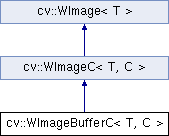|
| | WImageBufferC () |
| |
| | WImageBufferC (int width, int height) |
| |
| | WImageBufferC (IplImage *img) |
| |
| | ~WImageBufferC () |
| |
| void | Allocate (int width, int height) |
| |
| void | CloneFrom (const WImageC< T, C > &src) |
| |
| bool | IsNull () const |
| |
| void | ReleaseImage () |
| |
| void | SetIpl (IplImage *img) |
| |
| | WImageC (IplImage *img) |
| |
| virtual | ~WImageC ()=0 |
| |
| int | Channels () const |
| |
| void | CopyFrom (const WImageC< T, C > &src) |
| |
| WImageViewC< T, C > | View (int c, int r, int width, int height) |
| |
| virtual | ~WImage ()=0 |
| |
| int | Channels () const |
| |
| int | ChannelSize () const |
| |
| void | CopyFrom (const WImage< T > &src) |
| |
| int | Depth () const |
| |
| template<> |
| int | Depth () const |
| |
| template<> |
| int | Depth () const |
| |
| template<> |
| int | Depth () const |
| |
| template<> |
| int | Depth () const |
| |
| template<> |
| int | Depth () const |
| |
| template<> |
| int | Depth () const |
| |
| template<> |
| int | Depth () const |
| |
| int | Height () const |
| |
| T * | ImageData () |
| |
| const T * | ImageData () const |
| |
| IplImage * | Ipl () |
| |
| const IplImage * | Ipl () const |
| |
| T * | operator() (int c, int r) |
| |
| const T * | operator() (int c, int r) const |
| |
| int | PixelSize () const |
| |
| const T * | Row (int r) const |
| |
| T * | Row (int r) |
| |
| void | SetZero () |
| |
| WImageView< T > | View (int c, int r, int width, int height) |
| |
| int | Width () const |
| |
| int | WidthStep () const |
| |
template<typename T, int C>
class cv::WImageBufferC< T, C >
Like a WImageBuffer class but when the number of channels is known at compile time.



 Public Types inherited from cv::WImageC< T, C >
Public Types inherited from cv::WImageC< T, C > Public Types inherited from cv::WImage< T >
Public Types inherited from cv::WImage< T > Public Member Functions inherited from cv::WImageC< T, C >
Public Member Functions inherited from cv::WImageC< T, C > Public Member Functions inherited from cv::WImage< T >
Public Member Functions inherited from cv::WImage< T > Protected Member Functions inherited from cv::WImageC< T, C >
Protected Member Functions inherited from cv::WImageC< T, C > Protected Member Functions inherited from cv::WImage< T >
Protected Member Functions inherited from cv::WImage< T > Protected Attributes inherited from cv::WImage< T >
Protected Attributes inherited from cv::WImage< T > 1.8.13
1.8.13